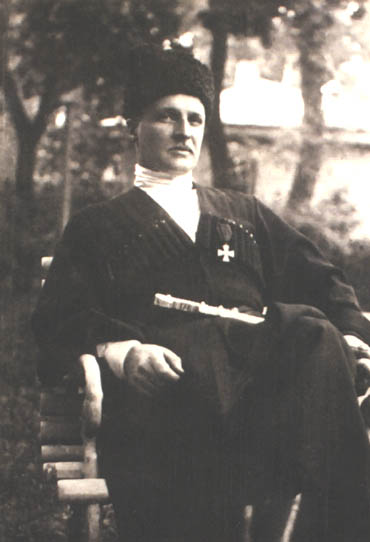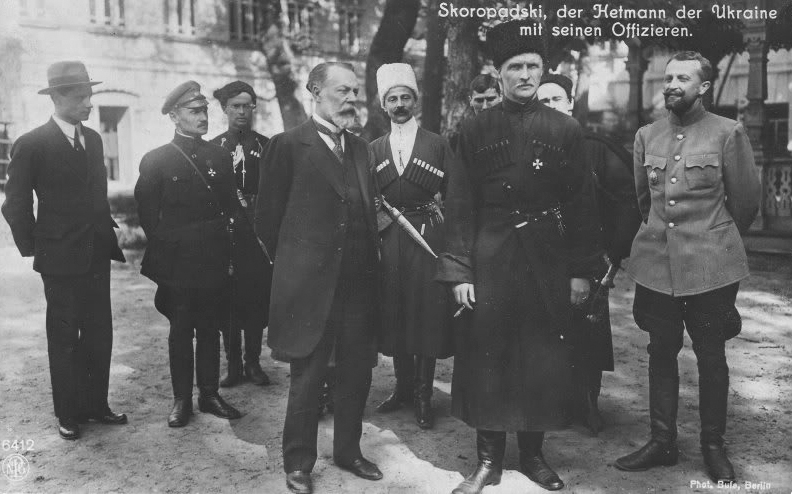<Back to Index>
- Oceanographer Vagn Walfrid Ekman, 1874
- Writer Konstantine Gamsakhurdia, 1893
- Hetman of Ukraine Pavlo Petrovych Skoropadskyi, 1873
PAGE SPONSOR


Pavlo Petrovych Skoropadskyi (German: Paul Petrowitsch Skoropadskyj; Russian: Павел Петрович Скоропадский; Ukrainian: Павло Петрович Скоропадський; 3 May 1873, Wiesbaden, Germany — 26 April 1945, Metten monastery clinic, Bavaria, Germany) was a Ukrainian politician, earlier an aristocrat and decorated Imperial Russian Army general. Skoropadsky became a conservative leader in Ukraine's unsuccessful struggle for independence following the Russian Revolution of 1917.
Skoropadsky was born in a family of Skoropadskie, the Ukrainian military leaders and statesmen, that distinguished themselves since the 17th century when Fedir Skoropadsky heroically participated in the Battle of Zhovti Vody. His father Petro Ivanovych Skoropadsky (1834 – 1885) was a Cavalry Guard Colonel and a veteran of the Caucasian War (Subjugation of Circassia, 1863). Afterwards he served as a marshal for the Starodub uyezd zemstvo (1869 – 1885) until his death. Pavlo's aunt Yelyzaveta Myloradovych (1832 – 1890) was a public activist and was married to Lev Myloradovych whose mother was from the Kochubey family. His grand father Ivan (1804 – 1887) also served as a marshal for the Pryliuky uyezd (1844 – 1847) and Poltava Governorate (1847 – 1852) zemstvas. He was known for building the Trostianets Dendrological Park (today in Chernihiv oblast). Pavlo's father Pyotr Ivanovich was also descendant of the Tarnowski family, while Pavlo's mother was the descendant of the Miklaszewski and Olsufiev families.
Pavlo grew up at his father's estate in Trostianets, Pryliuky uyezd, Poltava Governorate. He attended a gymnasium in Starodub and later graduated from the Page Corps cadet school in Saint Petersburg.
In 1893 Skoropadsky graduated from the Page Corps and was assigned as a cornet (meaning the 2LT in cavalry) to the Chevalier Guard regiment where he was put in charge of a squadron. After two years he was assigned a duty of the Regimental adjutant in the same regiment. In December 1897 he was promoted to Poruchik (1LT). In 1897 Skoropadsky also married Oleksandra Petrivna Durnovo, a daughter of Pyotr Pavlovich Durnovo, the General Governor of Moscow. Skoropadsky's first major assignment was as sotnia (company) commander in the 2nd Chita Cossack Regiment of the Trans - Baikal Cossack Host in Chita during the Russo - Japanese War. Later he became adjutant to the commander of the Russian forces on the Far East General Nikolay Linevich. During the war Skoropadsky was awarded the George's Weapon and several orders. In December 1905 Tsar Nikolai II made him a Fliegel - Adjutant in a rank of Colonel. On September 4, 1910 Colonel Skoropadsky was commissioned as the commander of the 20th Finnish Dragoon Regiment still continuing to be a Fliegel - Adjutant of the H.I.M. Retinue. On April 15, 1911 he was reassigned to the Leib - Guard Cavalry Regiment. Leib - Guards were the elite Russian military forces assigned for a personal protection of the emperor. On December 6, 1912 Skoropadsky was promoted to the Major General of the H.I.M. Retinue.
At the start of World War I Skoropadsky was put in charge of the reorganized 1st Brigade of the 1st Cavalry Guard Division (General Nikolai Kaznakov) as part of the 1st Army commanded by General Paul von Rennenkampf. Skoropadsky already worked for von Rennenkampf during the Russo - Japanese War when the last was commanding the Trans - Baikal Cossack Host. On August 6, 1914 his regiment distinguished itself in battles near Kraupishken as part of the Russian invasion of East Prussia.
Later he was appointed as a commander of the United Cavalry Guard
Division which distinguished itself near Kaushen. General Skoropadsky also
commanded the 5th Cavalry Division. On April 2, 1916 he was promoted to Lieutenant General and was commissioned in the 1st Cavalry Guard Division. From January 22 to July 2, 1917 he was in charge of the 34th Army Corps. In July 1917 the decommissioned 34th Army Corps was transformed into the 1st Ukrainian Corps. In October 1917 at the first Congress of the Free Cossacks he was awarded a title of the honorary Otaman. From October to November 1917 his 60,000 Army Corps successfully defended the railway corridor stretching through Podolie to Polissya, Vapniarka – Zhmerynka – Koziatyn – Shepetivka and defended against attacks from the Romanian front particularly the 2nd Guard Corps that was headed by Yevgenia Bosch.
On 29 April 1918, a coup d'etat toppled the Ukrainian People's Republic and Skoropadsky became Hetman (leader) of the Ukrainian State (Ukrayinska Derzhava). The same day he was sworn in by bishop Nykodym in Saint Sophia Cathedral as
the Hetman of Ukraine. The coup d'état had been sanctioned by
the German military, which in the spring of 1918 had occupied Kiev and other parts of Ukraine. The Ukrainian republican government was intent upon repelling an invasion by the Red Army.
In return, the Republican government pledged food stocks, which were to
be expropriated from the peasants. The German military command was
dissatisfied with the inefficiency and incompetence of the Republican
government, which repeatedly failed to deliver the supplies on time. Skoropadsky
was accused by other Ukrainian politicians of being a German puppet
supported by large local landowners. He was also considered too
pro-Russian and dictatorial: he formed a new cabinet comprising mostly
Russian monarchists, committed to a federation with a future
non-Bolshevik Russia. Despite these criticisms, by contrast with the earlier socialist Rada,
his government was given credit for having created an effective
administrative organization, established diplomatic ties with many
countries, concluded a peace treaty with Soviet Russia, and built many
schools and universities, including the National Academy of Sciences of Ukraine. In November 1918 Skoropadsky was removed from power in an uprising led by Symon Petliura and the withdrawal of German forces from Kiev. The uprising nominally restored the Ukrainian People's Republic, but power was vested in a Directoria, a provisional government of five directors chaired by Volodymyr Vynnychenko. Skoropadsky abdicated on December 14, 1918 and fled to Berlin. While
living in Germany he maintained close contacts with German government
and army officials originating from personal friendships reaching as
far back as his military college days; however, he consistently refused
offers to cooperate with the Nazi regime. During World War II, Skoropadsky fled before advancing Soviet forces along with the retreating German army. He died in at Metten Abbey in Germany after being wounded by an Allied bombing near Regensburg, and was buried in Oberstdorf. His
movement continued into the early 1980s, influencing a Ukrainian
monarchist program based on the Cossack State model. It ended gradually
with the aging of eastern Ukrainian émigré communities.
Skoropadsky's daughter, Olena Skoropadska - Ott resides in Switzerland, has visited Ukraine several times and has been honored for her historical writings.